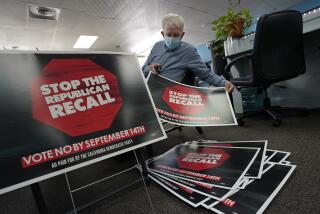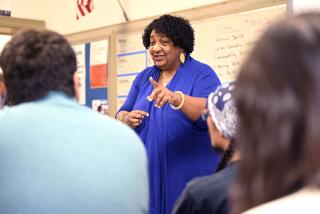Davis to Ask Court to Postpone Recall
- Share via
Amid mounting Democratic unease over his prospects for political survival, Gov. Gray Davis will ask the state Supreme Court today to delay the Oct. 7 recall election and revamp the ballot in a way that would improve his chances of staying in office.
But in the latest sign of how the support from within the governor’s own party has started to waver, state Senate President Pro Tem John Burton (D-San Francisco) will meet today with Senate Democrats to consider whether to back a Democratic candidate to replace Davis, in case voters oust him.
For the record:
12:00 a.m. Aug. 13, 2003 For The Record
Los Angeles Times Wednesday August 13, 2003 Home Edition Main News Part A Page 2 National Desk 2 inches; 91 words Type of Material: Correction
Ballot measures -- An article in Section A on Aug. 4 regarding the Oct. 7 gubernatorial recall election said the ballot would include two unrelated initiatives, one that would bar state use of racial statistics and another that would change rules for voter approval of local bond projects. The ballot will indeed include the racial statistics measure. But the other measure on the ballot would not change rules for voter approval of local bond projects. Rather, it would require a portion of the state’s budget be set aside for infrastructure spending.
Democratic senators oppose the recall, but asked for the meeting because they are “concerned that there is no fallback,” Burton said.
The governor’s pursuit of relief from the state’s highest court sets the stage for a week of high political drama as candidates face a deadline of 5 p.m. Saturday for filing papers to put their names on the recall ballot.
Davis has urged fellow Democrats to stay off the ballot, arguing that he is more likely to defeat the recall if the only serious candidates to succeed him are Republicans.
But some Democrats fear that strategy will doom their party to defeat if voters kick the unpopular governor out of office.
U.S. Sen. Barbara Boxer (D-Calif.) drew attention late last week when she said that Democrats shouldn’t “close off” the option of a replacement candidate.
Separately, three California Democrats in the House of Representatives have called on U.S. Sen. Dianne Feinstein (D-Calif.) to run; so far, she has turned them down.
“We are not setting up a campaign,” said Feinstein political advisor Kam Kuwata. “We have not polled. We have no organizational structure. Any of the kinds of things one would do to prepare, we certainly are not doing that.”
But with the party’s control of the most powerful state government post in the nation on the line, nervousness among Democratic leaders is building.
The meeting of Democratic state senators to discuss whether to break with the governor’s no-Democrat-on-the-ballot strategy illustrates the high anxiety as the party confronts an extraordinary election in which few of the standard campaign calculations apply.
“I don’t know how anybody can say with certainty: ‘Hey, calm down, it’s going to be all right,’ because it’s going to be tumultuous,” said Democratic strategist Bill Carrick.
This week, Democrats will closely review private polls taken over the last week by labor unions to gauge the outlook for Davis and the party’s prospects for staying in power.
Potential candidates are “watching out of the corner of their eye to figure out what their possible competitors are doing,” said Democratic consultant Darry Sragow.
“The notion that you’re going to have 15 big-name Republicans or Democrats to file at 4:59 on Aug. 9th is something that everybody has to contend with.”
Against the background of that restiveness in his party, Davis flew to Chicago on Sunday to seek campaign support from labor leaders at a meeting today of the AFL-CIO executive council. Labor support is critical to Davis’ fight against the recall.
So far, the only declared major party candidate is Rep. Darrell Issa, the San Diego County Republican who bankrolled the recall petition drive.
Other Republicans laying groundwork for the race are former Los Angeles Mayor Richard Riordan, state Sen. Tom McClintock of Thousand Oaks and Bill Simon Jr., the party’s 2002 gubernatorial nominee.
On the Democratic side, nobody widely known in California has signaled an intention to run.
The 2002 Green Party gubernatorial nominee, Peter Camejo, also has said he will run.
Actor Arnold Schwarzenegger, who has flirted with the race for months, is expected to announce Wednesday -- before appearing on NBC’s “Tonight Show” -- that he will not run.
In the Supreme Court case -- the fifth to be filed, but the first by Davis -- the governor and five of his supporters plan to challenge the constitutionality of California’s recall procedures.
Davis is California’s first statewide elected official to face a vote of confidence since voters put the right of recall into the state Constitution 92 years ago, so key legal issues have yet to be tested in court.
In a conference call with reporters Sunday, lawyers for the governor’s anti-recall committee said they would ask the high court to postpone the recall election until the March 2 presidential primary, the next regularly scheduled statewide election.
The suit will allege voting rights violations if the election takes place as scheduled Oct. 7, including the planned use of chad-producing punch-card ballot machines that were supposed to be replaced before the March election, they said.
The suit also will cite a sharp drop in the number of polling places that counties plan to open for the special election.
“The California Supreme Court has a chance to avert the train wreck we saw in Florida 2000,” said Kathleen Sullivan, dean of Stanford University Law School and a constitutional scholar on the Davis group’s conference call.
The suit also will seek a major change in the ballot rules. Under current rules, voters would face a two-part ballot: a yes-or-no vote on the proposed ouster of Davis, followed by a list of candidates running to replace him.
As it stands, the governor is barred from putting his name on the list of replacement candidates; the lawsuit will seek to overturn that prohibition.
To deny the governor a spot on the replacement ballot would violate one-person-one-vote protections in the U.S. Constitution, Davis’ lawyers said.
If Davis is recalled, the replacement candidate with the most votes would become governor. In a crowded race, the winner could in theory be elected governor with the backing of a relatively small portion of the electorate.
The number of “no” votes on the Davis recall question could thus exceed the number of votes won by the governor’s successor, effectively denying the governor’s supporters their voting rights, the lawyers argued.
“We believe that it’s just unfair for the governor to get the largest portion of the votes in this election in the yes-no portion, and yet be ineligible to be a candidate in the second portion of the ballot,” said Michael Kahn, a lawyer for the Davis committee, Californians Against the Costly Recall.
Issa spokesman Jonathan Wilcox said Davis “should spend more time trying to improve California’s fiscal plight and less time huddling with his lawyers, trying to figure out a way to subvert the Constitution.”
“Democracy delayed is democracy denied,” he said.
Amid the jockeying for position by prospective candidates this week, the Supreme Court could intervene and introduce further turmoil into planning for the recall election.
Last week, the court ordered lawyers for Secretary of State Kevin Shelley and Lt. Gov. Cruz Bustamante to respond today to demands in previous lawsuits for changes to the ballot.
Two lawsuits ask the Supreme Court to keep the names of replacement candidates off the recall ballot; they claim Bustamante is Davis’ legal successor. Another case seeks to set aside the requirements for candidates to get on the ballot: a $3,500 fee and 65 signatures.
Yet another urges the court to remove two unrelated initiatives from the recall ballot; one would bar state use of racial statistics, the other would change rules for voter approval of local bond projects.
The Supreme Court could cancel the election of a Davis successor or postpone the recall vote entirely while it weighs the legal issues, said Fred Woocher, a Santa Monica attorney who specializes in election law.
But election law experts said the most serious legal threats to the recall have yet to be filed.
The NAACP, for example, is expected to file a federal suit this week that would partly mirror the governor’s; it would seek to stop the use of punch-cards ballots and the consolidation of polling places. The suit would contend that both actions dilute minority voting strength in violation of federal law.
Meanwhile, lawyers for another Davis committee, Taxpayers Against the Governor’s Recall, are expected to return to a Los Angeles courtroom Friday to try to persuade the judge to call off or postpone the election because out-of-state residents allegedly collected some of the petition signatures, in violation of state law.
“With all of these lawsuits out there, delay may be inevitable,” said Richard L. Hasen, an election law expert who teaches at Loyola Law School in Los Angeles.
*
Times staff writer Virginia Ellis contributed to this report.
More to Read
Get the L.A. Times Politics newsletter
Deeply reported insights into legislation, politics and policy from Sacramento, Washington and beyond. In your inbox three times per week.
You may occasionally receive promotional content from the Los Angeles Times.











